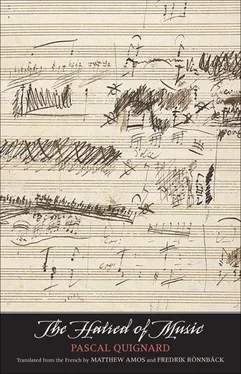
The raucous noise of Beijing. The immense and raucous, creaking, rusty, carting, slow, braking noise of the great avenue that crosses the city of Beijing.

Bazaar and vacarme are the same word. 3The Persian word bazaar comes from wescar . The Armenian word vacarme can be traced to wahacarana . They both designate the market street (word for word “the place where one goes to buy,” the city).
Sumerian texts say that the gods of Akkad could no longer sleep, so intense was the din made by the humans. They slowly lost their influence over the course of time as well as their splendor in the heavens. So they sent a flood to exterminate the humans, in order to silence their songs.

The prey that performers pursue is the silence of their audience. Performers seek the intensity of this silence. They seek to plunge those who give them their full attention into an extreme state of empty listening, preceding the making-yourself-heard.
Penetrating the preceding background noise in order to make place for the hell of a particular silence, of human silence.
In Clara Haskil’s words, after she had interpreted Mozart’s sonata in E minor at the Théâtre des Champs-Élysées. She confided to Gérard Bauer:
“I’ve never encountered such a silence. I don’t know if I will ever find it again.”
Six days later, Clara Haskil fell head first down the stairs of the Brussels-South railway station, the handrail slipping from her fingers.

Every man who works is righteous.
How is the artisan justified by his art? The man who works on a still nonexistent thing is justified by the unexpected emotion that sometimes overcomes him when he looks at what he has made in the past.
When we invent, the surprise of our invention eludes us, since we prepare it and adjust it. But time passes. And, when we have not retained the memory of its laborious production, it surprises us. This fate in which sources mix brings us closer to the impetuosity of the source. This proximity to chaos is what judges us. It is our only judge. We cannot truthfully make a virtue out of the joy it brings us in return. What comforts us in what we have made is neither the recognition by others, nor the moment of sale and the profit that results from it, nor the admiration of some, but the expectation of these unpredictable returns. It is not another world or posterity through centuries that motivates us: it is forgetting what we have done and which comes back to us as a new light, that destines our life to a short circuit of astonishment and annihilation of ourselves. These are ecstasies. We delight in losing ourselves in our works. Days then pass at the speed of falling lightning. Then we cry tears that are no longer our own and that mix with the first Flood that was sent by the deafened gods. We are swallowed up.

Works frighten codes. The open sea frightens seagulls like rats prefer the sewers of densely populated cities.
Those who pass judgment always remain on the shore.
Shouting, they provoke the shipwrecks for which they call with their good wishes.
The shrill cry of seabirds that fly above the white foam of the black waves of the sea. This cry is full of distress. They are searching for refuse to eat. They are searching for wrecks on which to land.

Why did the word siren , which designated the legendary birds of Homer’s epic, come to denote the piercing and terrifying call of industrial factories in the nineteenth century and the convocation to accident scenes of fire engines, police cars, and ambulances?

They are searching for wrecks on which to land.
It must be said: “Death is hungry.”
It is the business 4of failure.

The guardians of moral, esthetic, political, religious, social conditioning are always right: they take care of the symbolic control of the group.

Anna Akhmatova called newspaper critics and humanities professors “prison guards.”

I have noticed that all the people I have hated looked like men standing at attention.

I will never know when exactly music broke away from me. Everything acoustic suddenly, one fine morning, left me indifferent. Hardly did I come close to instruments by routine, or because of their visible beauty. Hardly had I opened a score, the melos no longer sounded, or dwindled, or I would recognize it as always similar to another, weariness ensued. Reading written books persisted in all its eagerness, its rhythm, its deprivation in my depths, but not the desire for song.
What was for me the world’s end has become an unbearable distraction.

We are also curious, climbing enigmas that plunge their roots into the future and that spread out toward the sky of the past.
It is possible that we are haunted more by our origin than by death. We are visited more often by the cave, the dark water of the amnion , the piercing voice of infancy than by the cadaverous body and the putrefied silence.

My fingers are empty.
I cannot bear order, meaning, peace. I gather the aftereffects of time. I rip to shreds the rules of the past and the present, which I have never understood.
Logos once meant “collection.” I collect rubble, patches of fugitive light,
“dead intervals,”
the intruder and the lost,
the sordidissima of the cavern: night is the bottom of the worlds. Everything goes toward nonlanguage. I have attempted to bring back things that were without code, without song and without language, and that roam toward the source of the world. It was necessary to think the lack of exit of an empty predatory function. Had I wanted to revive the anachoretic epidemic of the ancient Romans, when Augustus bloodily imposed the empire, or the baroque exile of the Recluses that Rome, the ministry, and the king hounded and sought to eradicate, perturbing the images that historians had constructed, I would not have done any differently. I would like to have plunged everything back into a sort of mythical activity.
Being born serves no purpose and knows no end: certainly not death.
There is no end because death does not finish. Death does not terminate: it interrupts.

The dead interval is the hand that time extends to us. If death interrupts, this interruption is within us; it is in our sexed bodies, in our birth, in our cry as in our sleep. In our breath as in our thought. In our walking on two feet as in human language.
The dead interval, of which we are a precarious dependency, explodes in everything.
Читать дальше













